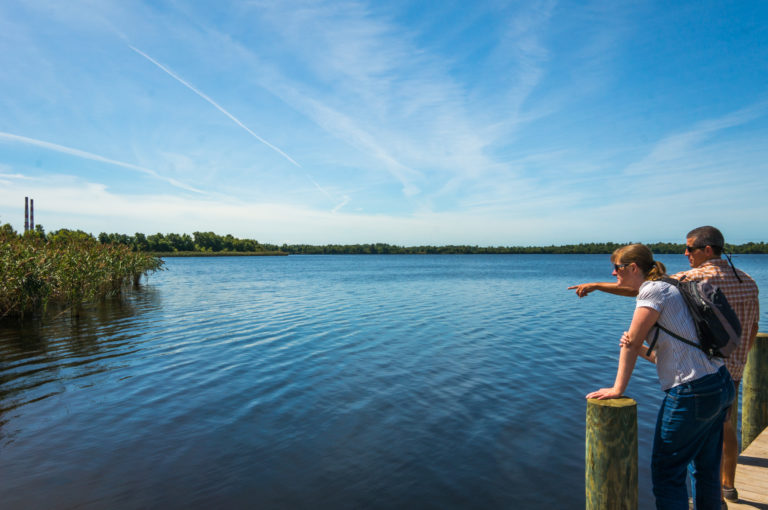Conservation Groups Act to Join State Charges against Progress Energy’s Coal Ash Pollution at Sutton Plant Near Wilmington
By: Waterkeeper Alliance

Conservation Groups Act to Join State Charges against Progress Energy’s Coal Ash Pollution at Sutton Plant Near Wilmington
CHAPEL HILL, N.C.—Conservation groups today filed in court to join North Carolina’s complaint against Duke Energy Progress over its illegal groundwater pollution from coal ash at its Sutton facility near Wilmington, N.C. The coal waste has contaminated the area with arsenic, selenium, and other toxic pollutants, which threaten a local community’s drinking water supply.
The motion to intervene in the state enforcement action was filed by the Southern Environmental Law Center on behalf of Cape Fear River Watch, the Sierra Club, and the Waterkeeper Alliance. The state’s suit was a response to a 60-Day Notice of intent from those groups that they bring suit against Progress for its Sutton coal ash pollution.
“The groundwater pollution at Sutton is serious and threatens the drinking water wells for the nearby Flemington community,” said Frank Holleman, the senior attorney for the Southern Environmental Law Center who represents the groups. “Independent citizens groups must be at the table to be sure that the public is protected from Progress’s serious coal ash pollution.”
Near the end of the 60-Day Notice period on August 16, North Carolina sued Progress for illegal coal ash pollution at six coal ash sites, including Sutton. The state set out under oath that the pollution “poses a serious danger to the health, safety, and welfare of the people of the State of North Carolina and serious harm to the water resources of the State.” In a separate action, North Carolina also sued Duke Energy Carolinas, a sister company, for coal ash pollution at six other locations across the state. In total, pollution from Duke Energy’s coal ash waste at 14 facilities in North Carolina is now before the courts.
“We want to ensure that this illegal pollution is cleaned up and that the drinking water for the Flemington community is protected. I and our members shop, fish, and live near this site, and it must be cleaned up,” said Kemp Burdette, the Cape Fear Riverkeeper.
The Flemington community is a low-income, racially diverse neighborhood near the coal ash lagoons. Coal ash is contaminating groundwater that flows in the direction of the community’s drinking water wells. Flemington’s water supply is listed by the state as being at high risk of contamination. The community also has a history of water pollution problems; it was switched to the current wells after its previous wells were contaminated by a nearby landfill.
In the action, North Carolina specifically lists “Risk Factors” at Sutton due to violations of groundwater standards at eight monitoring wells upgradient of drinking water wells for the Flemington community. The enforcement action sets out that the drinking water wells are only 2200 feet from the monitoring wells that show elevated levels of coal ash pollutants and only 2700 feet from the coal ash lagoon itself. The monitoring wells show illegal pollution by Arsenic, Thallium, Boron, Manganese, Iron, and ph.
“This coal ash pollution is a toxic legacy that is illegally polluting our groundwater and threatening our drinking water,” said Kelly Martin of the Sierra Club’s Beyond Coal Campaign. “It is long past time to clean this mess up.”
North Carolina sets out that Progress has illegally contaminated the groundwater at Sutton with a long list of pollutants, including toxic substances: Arsenic, Selenium, Lead, Thallium, Boron, Antimony, Manganese, Iron, Sulfate, and Total Dissolved Solids.
“We brought this illegal pollution to North Carolina’s attention through our 60-Day Notice, and we should be in the enforcement action to see that it is properly and fully cleaned up not studied indefinitely,” said Donna Lisenby, Global Coal Coordinator for the Waterkeeper Alliance. “Our communities and our natural resources must be protected from this toxic threat.”
The North Carolina courts have previously allowed the Southern Environmental Law Center and conservation groups to intervene in coal ash suits at the Progress Skyland plant near Asheville and at the Duke Energy Carolinas plant at Mountain Island Lake near Charlotte.
###
About Cape Fear River Watch
Founded in 1993, Cape Fear River Watch works to protect and improve the water quality of the Lower Cape Fear River Basin through education, advocacy, and action.
About the Sierra Club
Sierra Club is America’s largest and most influential grassroots environmental organization. Inspired by nature, we are 2.1 million of your friends and neighbors, working together to protect our communities and the planet. Read more at http://www.sierraclub.org.
About the Waterkeeper Alliance
Founded in 1999 by environmental attorney and activist Robert F. Kennedy, Jr. and several veteran Waterkeeper Organizations, Waterkeeper Alliance is a global movement of on-the-water advocates who patrol and protect over 100,000 miles of rivers, streams and coastlines in North and South America, Europe, Australia, Asia and Africa.
About the Southern Environmental Law Center
The Southern Environmental Law Center is a regional nonprofit using the power of the law to protect the health and environment of the Southeast (Virginia, Tennessee, North and South Carolina, Georgia, and Alabama). Founded in 1986, SELC’s team of more than 60 legal and policy experts represent more than 100 partner groups on issues of climate change and energy, air and water quality, forests, the coast and wetlands, transportation, and land use. www.SouthernEnvironment.org
Contacts:
Frank Holleman, Senior Attorney, SELC: 864-979-9431, [email protected]
Representing: Kemp Burdette, Cape Fear Riverkeeper: 910-762-5606, [email protected]
Kelly Martin, Sierra Club: 828-251-1272, [email protected]
Donna Lisenby, Waterkeeper Alliance: (704) 277-6055, [email protected]